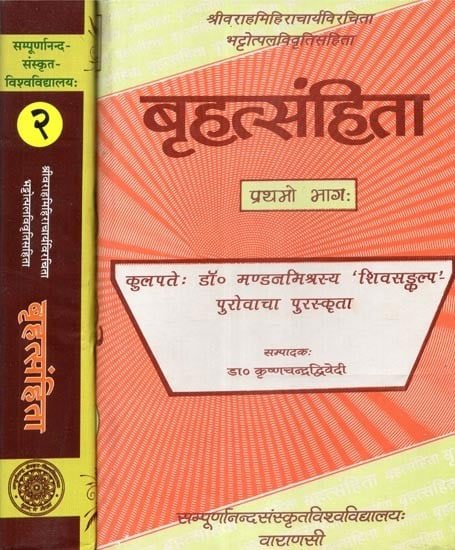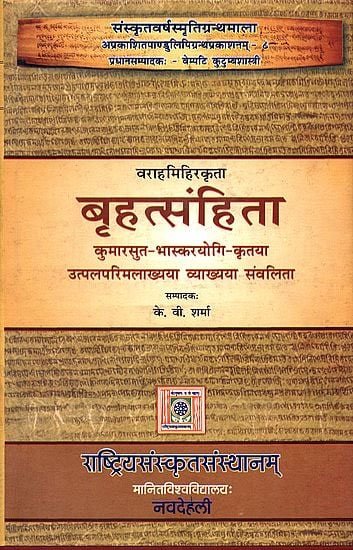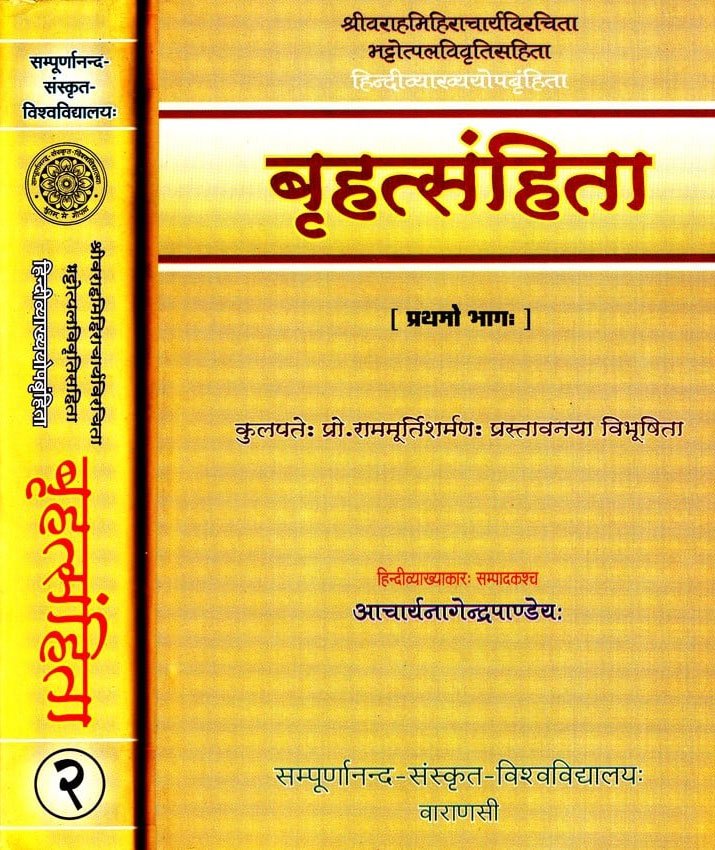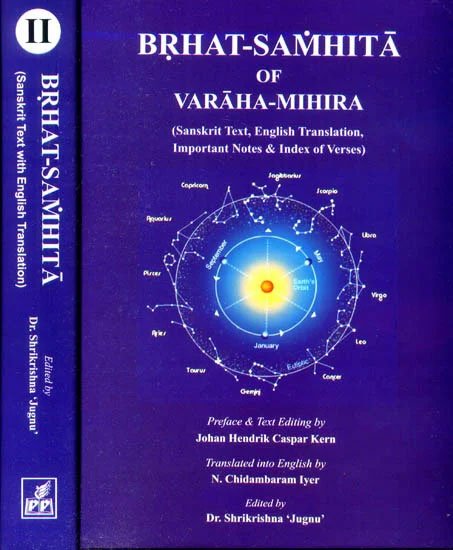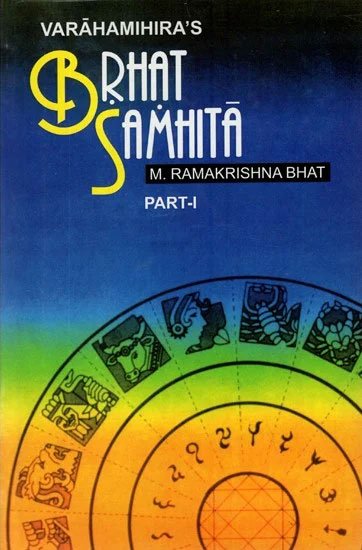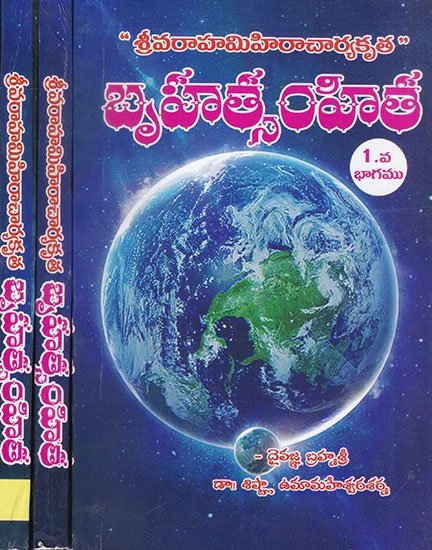Brihat-samhita [sanskrit]
26,560 words
The Sanskrit text of the Brihat-samhita from the 6th-century authored by Varaha Mihira in present-day Ujjain, India. It primarily deals with astrology and astronomy but is presented as an encyclopedia of knowledge.
Verse 97.13
न स्नातमात्रगमनोन्मुखभूषितानामभ्यक्तभुक्तरणकालनिरासनानाम् ।
सन्ध्यानिशाशनिकुजार्कतिथौ च रिक्ते क्षौरं हितं न नवमेऽह्नि न चापि विष्ट्याम् ॥ १३ ॥
[उत्सुक । निशोः कुजयमार्कदिने]
na snātamātragamanonmukhabhūṣitānāmabhyaktabhuktaraṇakālanirāsanānām |
sandhyāniśāśanikujārkatithau ca rikte kṣauraṃ hitaṃ na navame'hni na cāpi viṣṭyām || 13 ||
[utsuka | niśoḥ kujayamārkadine]
The Sanskrit text of Verse 97.13 is contained in the book Brihata Samhita (Sanskrit Text with Hindi Translation) by Pandit Achyutananda Jha. This book is available online or you could buy the latest edition:
Read online Buy now! The Sanskrit text by Pandit Achyutananda Jha (2001)
Glossary of Sanskrit terms
Note: This extracts Sanskrit terms and links to English definitions from the glossary, based on an experimental segmentation of verse (97.13). Some terms could be superfluous while some might not be mentioned. Click on the word to show English definitions.
Snata, Atra, Gamana, Unmukha, Bhushita, Abhyakta, Bhukta, Ranaka, Ira, Asana, Sandhya, Shasha, Kuja, Arka, Titha, Rikta, Kshaura, Hita, Navama, Ahan, Capin, Capi, Vishti, Utsuka,
Analysis of Sanskrit grammar
Note: this is an experimental feature and only shows the first possible analysis of the Sanskrit text (Verse 97.13). If the system was successful in segmenting the sentence, you will see of which words it is made up of, generally consisting of Nouns, Pronouns, Verbs, Participles and Indeclinables. Click on the link to show all possible derivations of the word.
- Line 1: “na snātamātragamanonmukhabhūṣitānāmabhyaktabhuktaraṇakālanirāsanānām ”
- na -
-
na (indeclinable particle)[indeclinable particle]na (noun, masculine)[compound], [vocative single]na (noun, neuter)[compound], [vocative single]
- snātam -
-
snāta (noun, masculine)[adverb], [accusative single]snāta (noun, neuter)[adverb], [nominative single], [accusative single]snātā (noun, feminine)[adverb]√snā -> snāta (participle, masculine)[accusative single from √snā class 2 verb], [accusative single from √snā class 4 verb]√snā -> snāta (participle, neuter)[nominative single from √snā class 2 verb], [accusative single from √snā class 2 verb], [nominative single from √snā class 4 verb], [accusative single from √snā class 4 verb]√snā (verb class 2)[imperative active second dual]
- ātra -
-
ātra (noun, neuter)[compound], [vocative single]
- gamano -
-
gamana (noun, masculine)[compound], [vocative single]gamana (noun, neuter)[compound], [vocative single]gamanā (noun, feminine)[nominative single]
- unmukha -
-
unmukha (noun, masculine)[compound], [vocative single]unmukha (noun, neuter)[compound], [vocative single]
- bhūṣitānām -
-
√bhūṣ -> bhūṣita (participle, masculine)[genitive plural from √bhūṣ]√bhūṣ -> bhūṣita (participle, neuter)[genitive plural from √bhūṣ]√bhūṣ -> bhūṣitā (participle, feminine)[genitive plural from √bhūṣ]
- abhyakta -
-
abhyakta (noun, masculine)[compound], [vocative single]abhyakta (noun, neuter)[compound], [vocative single]
- bhukta -
-
bhukta (noun, masculine)[compound], [vocative single]bhukta (noun, neuter)[compound], [vocative single]
- raṇakā -
-
raṇaka (noun, masculine)[compound], [vocative single]
- ālan -
-
√al (verb class 1)[imperfect active third plural]
- irā -
-
irā (noun, feminine)[nominative single]√ir (verb class 6)[imperative active second single]
- asanānām -
-
asana (noun, masculine)[genitive plural]asana (noun, neuter)[genitive plural]asanā (noun, feminine)[genitive plural]
- Line 2: “sandhyāniśāśanikujārkatithau ca rikte kṣauraṃ hitaṃ na navame'hni na cāpi viṣṭyām || 13 |”
- sandhyāni -
-
sandhya (noun, neuter)[nominative plural], [vocative plural], [accusative plural]
- śāśa -
-
śāśa (noun, masculine)[compound], [vocative single]śāśa (noun, neuter)[compound], [vocative single]
- ni -
-
ni (noun, masculine)[compound], [adverb]ni (noun, neuter)[compound], [adverb], [nominative single], [vocative single], [accusative single]ni (noun, feminine)[compound], [adverb]nī (noun, masculine)[adverb]nī (noun, neuter)[compound], [adverb], [nominative single], [vocative single], [accusative single]nī (noun, feminine)[adverb]ni (Preverb)[Preverb]
- kujā -
-
kuja (noun, masculine)[compound], [vocative single]kuja (noun, neuter)[compound], [vocative single]kujā (noun, feminine)[nominative single]√kuj (verb class 6)[imperative active second single]
- arka -
-
arka (noun, masculine)[compound], [vocative single]arka (noun, neuter)[compound], [vocative single]
- tithau -
-
titha (noun, masculine)[nominative dual], [vocative dual], [accusative dual]
- ca -
-
ca (indeclinable conjunction)[indeclinable conjunction]ca (noun, masculine)[compound], [vocative single]ca (noun, neuter)[compound], [vocative single]
- rikte -
-
rikta (noun, masculine)[locative single]rikta (noun, neuter)[nominative dual], [vocative dual], [accusative dual], [locative single]riktā (noun, feminine)[nominative dual], [vocative single], [vocative dual], [accusative dual]√ric -> rikta (participle, masculine)[locative single from √ric class 1 verb], [locative single from √ric class 4 verb], [locative single from √ric class 7 verb]√ric -> rikta (participle, neuter)[nominative dual from √ric class 1 verb], [vocative dual from √ric class 1 verb], [accusative dual from √ric class 1 verb], [locative single from √ric class 1 verb], [nominative dual from √ric class 4 verb], [vocative dual from √ric class 4 verb], [accusative dual from √ric class 4 verb], [locative single from √ric class 4 verb], [nominative dual from √ric class 7 verb], [vocative dual from √ric class 7 verb], [accusative dual from √ric class 7 verb], [locative single from √ric class 7 verb]√ric -> riktā (participle, feminine)[nominative dual from √ric class 1 verb], [vocative single from √ric class 1 verb], [vocative dual from √ric class 1 verb], [accusative dual from √ric class 1 verb], [nominative dual from √ric class 4 verb], [vocative single from √ric class 4 verb], [vocative dual from √ric class 4 verb], [accusative dual from √ric class 4 verb], [nominative dual from √ric class 7 verb], [vocative single from √ric class 7 verb], [vocative dual from √ric class 7 verb], [accusative dual from √ric class 7 verb]√rij -> rikta (participle, masculine)[locative single from √rij class 1 verb]√rij -> rikta (participle, neuter)[nominative dual from √rij class 1 verb], [vocative dual from √rij class 1 verb], [accusative dual from √rij class 1 verb], [locative single from √rij class 1 verb]√rij -> riktā (participle, feminine)[nominative dual from √rij class 1 verb], [vocative single from √rij class 1 verb], [vocative dual from √rij class 1 verb], [accusative dual from √rij class 1 verb]
- kṣauram -
-
kṣaura (noun, masculine)[adverb], [accusative single]kṣaura (noun, neuter)[adverb], [nominative single], [accusative single]kṣaurā (noun, feminine)[adverb]
- hitam -
-
hita (noun, masculine)[adverb], [accusative single]hita (noun, neuter)[adverb], [nominative single], [accusative single]hitā (noun, feminine)[adverb]√hi -> hita (participle, masculine)[accusative single from √hi class 5 verb]√hi -> hita (participle, neuter)[nominative single from √hi class 5 verb], [accusative single from √hi class 5 verb]
- na -
-
na (indeclinable particle)[indeclinable particle]na (noun, masculine)[compound], [vocative single]na (noun, neuter)[compound], [vocative single]
- navame' -
-
navama (noun, masculine)[locative single]navama (noun, neuter)[nominative dual], [vocative dual], [accusative dual], [locative single]navamā (noun, feminine)[nominative dual], [vocative single], [vocative dual], [accusative dual]
- ahni -
-
ahan (noun, neuter)[locative single]
- na -
-
na (indeclinable particle)[indeclinable particle]na (noun, masculine)[compound], [vocative single]na (noun, neuter)[compound], [vocative single]
- cāpi -
-
cāpin (noun, masculine)[compound], [adverb]cāpin (noun, neuter)[compound], [adverb], [nominative single], [vocative single], [accusative single]cāpī (noun, masculine)[compound], [adverb]cāpī (noun, feminine)[compound], [adverb], [vocative single]cāpī (noun, neuter)[compound], [adverb], [nominative single], [vocative single], [accusative single]cāpi (noun, masculine)[compound], [adverb]cāpi (noun, feminine)[compound], [adverb]cāpi (noun, neuter)[compound], [adverb], [nominative single], [vocative single], [accusative single]
- viṣṭyām -
-
viṣṭi (noun, feminine)[locative single]viṣṭī (noun, feminine)[locative single]
- Cannot analyse 13
- Line 3: “[utsuka ”
- utsuka -
-
utsuka (noun, masculine)[compound], [vocative single]utsuka (noun, neuter)[compound], [vocative single]
Other editions:
Also see the following editions of the Sanskrit text or (alternative) English translations of the Verse 97.13
Brhatsamhita with the Commentary of Bhattotpala
by Krishna Chandra Dwivedi (2016)
Publisher: Sampurnanand Sanskrit University; 1229 pages;
Buy now!
Brihat Samhita with the Commentary of Utpalapatimala of Yogisvara
by K. V. Sharma (2012)
Publisher: Rashtriya Sanskrit Sansthan, Janakpuri; 754 pages; ISBN-10; 8186111360; ISBN-13: 9788186111369
Buy now!
Brihat Samhita (Hindi Translation)
by K. V. Sharma (2002)
Publisher: Sampurnanand Sanskrit University; 2359 pages; ISBN-13: 9789387890008.
Buy now!
Brhat Samhita (English translation)
by N. Chidambaram Iyer (2022)
Publisher: Parimal Publication Pvt. Ltd.; 801 pages; Edited by Dr. Shrikrishna Jugnu; ISBN-10: 8171104215; ISBN-13: 9788171104215.
Buy now!
Brhat Samhita (English with notes)
by M. Ramakrishna Bhat (2010)
Publisher: Motilal Banarsidas Publishers Pvt. Ltd.; 1155 pages; ISBN-10: 8120810600; ISBN-13: 9788120810600.
Buy now!
Brhat Samhita (Telugu translation)
by Sishtla Umamaheswara Sharma (2020)
Publisher: Mohan Publications, Andhra Pradesh; 846 pages.
Buy now!Preview of verse 97.13 in Kannada sript:
ನ ಸ್ನಾತಮಾತ್ರಗಮನೋನ್ಮುಖಭೂಷಿತಾನಾಮಭ್ಯಕ್ತಭುಕ್ತರಣಕಾಲನಿರಾಸನಾನಾಮ್ ।
ಸನ್ಧ್ಯಾನಿಶಾಶನಿಕುಜಾರ್ಕತಿಥೌ ಚ ರಿಕ್ತೇ ಕ್ಷೌರಂ ಹಿತಂ ನ ನವಮೇಽಹ್ನಿ ನ ಚಾಪಿ ವಿಷ್ಟ್ಯಾಮ್ ॥ ೧೩ ॥
[ಉತ್ಸುಕ । ನಿಶೋಃ ಕುಜಯಮಾರ್ಕದಿನೇ]
Brhat Samhita (Gujarati translation)
by - (2000)
Publisher: Shree Harihar Pustakalay, Surat; Author: Shri Varahamihira Acharya (શ્રી વરાહમિહીરાચાર્ય); 432 pages.
Buy now!Preview of verse 97.13 in Gujarati sript:
ન સ્નાતમાત્રગમનોન્મુખભૂષિતાનામભ્યક્તભુક્તરણકાલનિરાસનાનામ્ ।
સન્ધ્યાનિશાશનિકુજાર્કતિથૌ ચ રિક્તે ક્ષૌરં હિતં ન નવમેઽહ્નિ ન ચાપિ વિષ્ટ્યામ્ ॥ ૧૩ ॥
[ઉત્સુક । નિશોઃ કુજયમાર્કદિને]
Brhat Samhita (Kannada translation)
by Sripada Raghunatha Kulkarni (2021)
Publisher: Srinidhi Publications, Bangalore; 668 pages with illustrations.
Buy now!Preview of verse 97.13 in Kannada sript:
ನ ಸ್ನಾತಮಾತ್ರಗಮನೋನ್ಮುಖಭೂಷಿತಾನಾಮಭ್ಯಕ್ತಭುಕ್ತರಣಕಾಲನಿರಾಸನಾನಾಮ್ ।
ಸನ್ಧ್ಯಾನಿಶಾಶನಿಕುಜಾರ್ಕತಿಥೌ ಚ ರಿಕ್ತೇ ಕ್ಷೌರಂ ಹಿತಂ ನ ನವಮೇಽಹ್ನಿ ನ ಚಾಪಿ ವಿಷ್ಟ್ಯಾಮ್ ॥ ೧೩ ॥
[ಉತ್ಸುಕ । ನಿಶೋಃ ಕುಜಯಮಾರ್ಕದಿನೇ]
![Brihat-samhita [sanskrit] - book cover](/uploads/a/Brihat-Samhita-Sanskrit.jpg)
